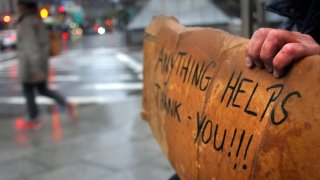
BOSTON, MA – OCTOBER 25: A panhandler asks for help opposite South Station in Boston on a very rainy day in the city, Oct. 25, 2017. He said there is enough food aid in the city from shelters and churches that nobody need go hungry. Panhandling is a tragic reality of city life, a reminder of the poverty that persists alongside the bustle of our most successful neighborhoods. But those who have peered deeply into the netherworld of public begging have found a subculture, in some ways as orderly and rule-bound as any professional community. (Photo by Lane Turner/The Boston Globe via Getty Images)
The highest court in Massachusetts on Tuesday struck down a state law making it illegal for people to ask for money for their own support on public roads.
A decision from the Supreme Judicial Court found that the law violated free speech rights because it prohibited people from requesting money for personal support on roadways but specifically allowed the sale of newspapers or event tickets.
The court concluded that asking motorists for personal donations "poses no greater threat to traffic safety than engaging in the same conduct for other" purposes that are permitted under the law.
The American Civil Liberties Union of Massachusetts challenged the ordinance in a 2019 lawsuit accusing Fall River of aggressive enforcement. The group represented two homeless men who were accused of violating the law more than 40 times by Fall River police.
Paul Coogan, the mayor of Fall River, said he supports the court's decision. Even before the ruling, the city had stopped enforcing the law, he said.
"We have to make sure in Massachusetts we treat all people and groups equally, and that's basically what the court said," Coogan said.
The ACLU of Massachusetts urged law enforcement agencies across the state to take heed of the decision.
Local
"This ruling is timely, as a growing number of Massachusetts residents may need to rely on support from the public to make ends meet in the face of our current economic downturn," said Ruth Bourquin, senior and managing attorney of the group.
The civil rights group said similar "anti-panhandling" ordinances in Worcester and Lowell were ruled unconstitutional in recent years.